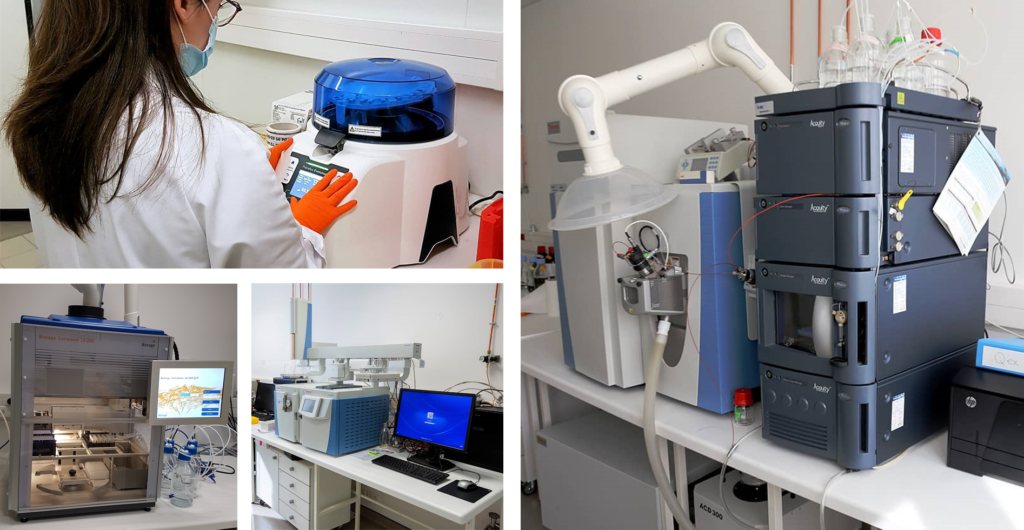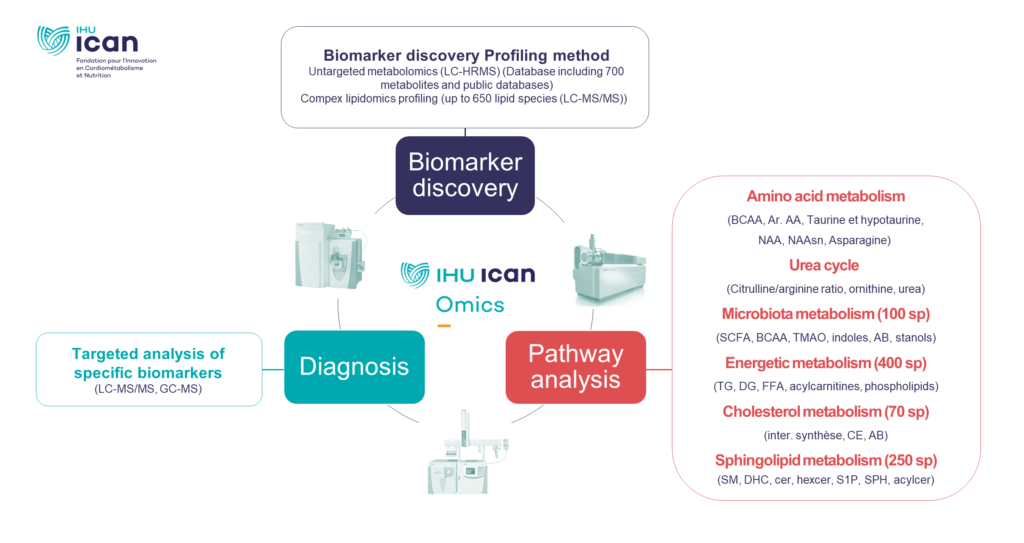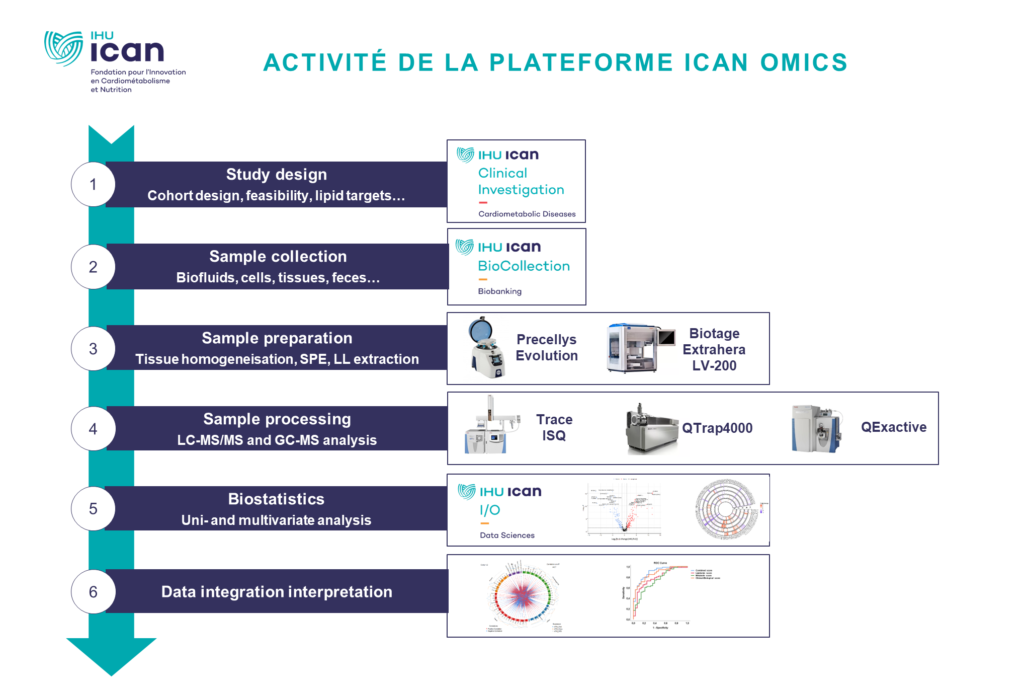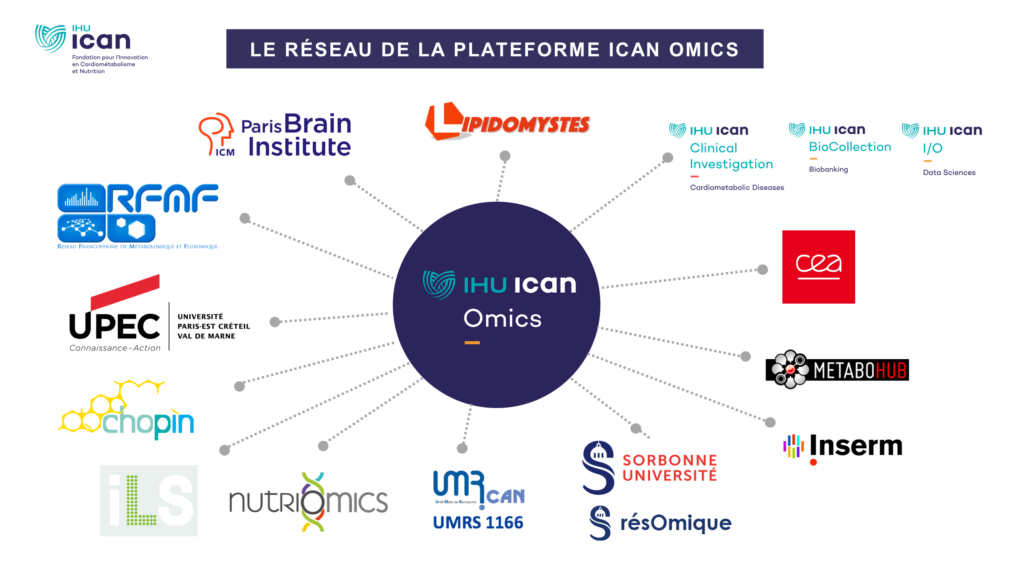What is metabolomics?
Metabolomics is the exhaustive study of all small organic molecules (less than 1000 Da). Metabolites and the associated biochemical reactions form a common basis for the proper functioning of all organisms, with some specific features in certain cases.

It is therefore possible to analyse the metabolites contained in biological matrices (plasma, serum, tissues, faeces, etc.) in order to identify deregulations, compared with a control population for example.
The metabolism is based on a fragile balance: it responds constantly to recurrent external stimuli such as food, or to more specific stimuli such as the appearance of a pathology.
The ultimate aim is to detect and quantify these metabolites that are outside the norm, in order to improve the prevention and/or treatment of various diseases (better stratification of patients for more personalised treatment, adaptation of their lifestyle, etc.).
The ICAN Omics metabolomics platform
The expertise of the ICAN Omics metabolomics platform is to offer different approaches to help develop precision medicine.
With a simple blood test and a signature including various specific metabolites, it is possible to improve the prevention and/or treatment of various pathologies.

- Our approaches are based on the profiling of a large number of metabolites using multidisciplinary skills combining bioinformatics, statistical tools and biochemical databases to interpret the results using a high-resolution mass spectrometer coupled with chromatographic systems.
- Our approaches are suited to the search for candidate biomarkers for diagnostic, prognostic and treatment response purposes.
- Other so-called targeted (or profiling) approaches are based on published or known markers in order to verify and/or validate their relevance to a disease, or to represent a specific signature of a population.
Our expertise
- Metabolome studies
- Acquisition and interpretation of metabolomic profiles
- Analysis and quantification of several families of metabolites
- Advice on and implementation of metabolomic assays
- Annotation, identification and structural elucidation of metabolites (HRMS, MS/MS)
- Development and implementation of custom methods

Targeted approach
- Absolute quantification of amino acids, tryptophan pathway, choline metabolism pathway (TMAO, Choline…), short-chain fatty acids (SCFAs), bile acids (in dvlpt)
Non-targeted approach
- Study of the global metabolome using several chromatographic methods
- Detection of over 200 metabolites in biofluids (plasma-serum)

Profiling method
Detection and relative quantification of compounds linked to the microbiota and belonging to the
- Method 1: amino acids, organic compounds, phenols, methylamines and some indoles
- Method 2: Acylcarnitines, free fatty acids and bile acids
Biological study matrices
- Serum-Plasma, CSF, urine, faeces, cecum, PBMC and glial cells.
- Other matrices under pilot study conditions
Contact the operational manager for further information – Farid Ichou f.ichou@ihuican.org

Steering committee
Philippe Lesnik (DR, UMR ICAN 1166)
Scientific Director
Farid Ichou (IR, ICAN)
Operational manager
Scientific Committee
- Dr F. Fenaille (CEA)
- Dr I. Gomperts Boneca (Institut Pasteur)
- Dr F. Lamari (APHP)
- Dr W. Le Goff (UMR ICAN 1166)
- Pr F. Mochel (ICM)
Access conditions
Access to our platform is via an analytical request.
The procedure after receipt of the request form is as follows:
- Submission of the request form to the platform via “demande Analytique” to the platform manager Farid Ichou: f.ichou@ihuican.org
- Assessment of the project and preparation of a pricing proposal
- Validation of the specifications and signature of a quotation/agreement
- Receipt of samples
- Carrying out the work in accordance with the specifications (or estimate)
- Presentation of the final study report
Contact
Farid Ichou (IR, ICAN)
01 84 82 77 68
47-48 bd de l’hôpital
75013 Paris, France
ICAN – bât E3M – 6th floor
Major publications ICAN Omics
Latest publications
26/03/2025
MAIT Cells Promote Cholesterol Excretion Pathways Mitigating Atherosclerosis
28/10/2024
12/03/2024
15/12/2023
17/10/2023
01/10/2023
Deleterious functional consequences of perfluoroalkyl substances accumulation into the myelin sheath
01/09/2023
23/08/2023
27/07/2023
28/03/2023
09/12/2022
Impacts of a high-fat diet on the metabolic profile and the phenotype of atrial myocardium in mice
19/05/2022
13/04/2022
Older publications
28/10/2020
13/08/2020
10/01/2020
Exploring the Bacterial Impact on Cholesterol Cycle: A Numerical Study
27/11/2019
The intestinal microbiota regulates host cholesterol homeostasis
11/10/2019
10/03/2017
21/01/2016
08/11/2014
Circulating phospholipid profiling identifies portal contribution to NASH signature in obesity
01/11/2013
Unraveling the complexities of the HDL lipidome
03/10/2013









